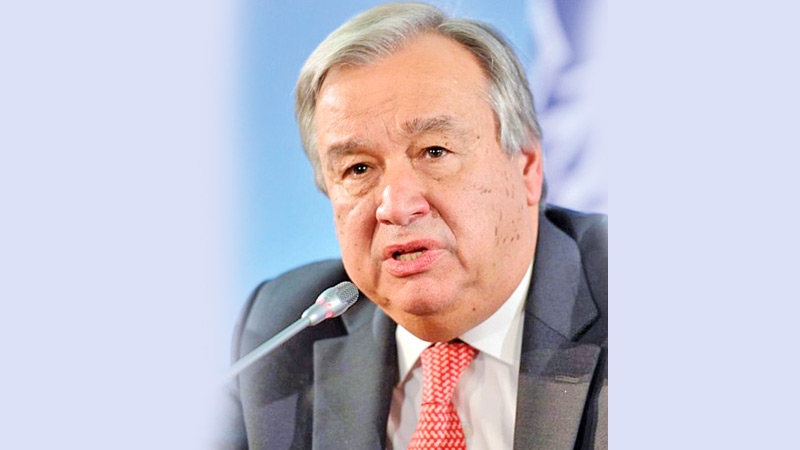Amidst the triple environmental threat of biodiversity loss, climate disruption, and escalating pollution, United Nations (UN) Secretary-General António Guterres launched “an unprecedented effort to heal the Earth” on World Environment Day, last Friday.
Launching the ‘UN Decade on Ecosystem Restoration’, Guterres said the planet was rapidly reaching a “point of no return” while cutting down forests, polluting rivers and oceans, and ploughing grasslands “into oblivion”.
“We are ravaging the very ecosystems that underpin our societies,” the UN chief said. “Our degradation of the natural world is destroying the very food, water, and resources we need to survive. We are undermining the well-being of 3.2 billion people—or 40% of humanity.”
“However, the Earth is resilient, and we still have time to reverse the damage we have done,” he said. He added that by restoring ecosystems, “we can drive a transformation that will contribute to the achievement of all the Sustainable Development Goals (SDGs)”.
“Accomplishing these things will not only safeguard the planet’s resources, it will create millions of new jobs by 2030, generate returns of over $7 trillion dollars every year, and help eliminate poverty and hunger,” Guterres said.
The UN Chief described the ‘decade of restoration’ as “a global call to action” that would draw together “political support, scientific research, and financial muscle to massively scale up restoration”. He pointed out that the next 10 years are “our final chance to avert a climate catastrophe, turn back the deadly tide of pollution, and end species loss”.
“Everyone can contribute,” said the Secretary-General. “So, let today be the start of a new decade—one in which we finally make peace with nature and secure a better future for all.”
Meanwhile, UN independent human rights experts have called on the UN to formally recognise that living in a safe, healthy, and sustainable environment is “indeed a human right”.
“Of the UN’s 193 members, 156 have written this right into their constitutions, legislations, and regional treaties, and it is time for the United Nations to provide leadership by recognising that every human is entitled to live in a clean environment,” they said in a joint statement marking World Environment Day.
“The lives of billions of people on this planet would improve if such a right were adopted, respected, protected, and fulfilled”, UN experts added.
Nearly 50 years after the Stockholm Declaration on the Human Environment, in which Member States declared that people have a fundamental right to “an environment of a quality that permits a life of dignity and well-being”, the time is ripe for concrete action, they said, calling on both the Human Rights Council and the General Assembly to take action.
A surge in emerging diseases that jump from animals to humans, such as COVID-19, along with the climate emergency, pervasive toxic pollution, and a dramatic loss of biodiversity, have brought the future of the planet to the top of the international agenda, experts said. They added that human rights must be put at the centre of any measures to tackle the environmental crisis.
“Putting human rights at the heart of these actions clarifies what is at stake, catalyses ambitious action, emphasises prevention and, above all, protects the most vulnerable people on our planet,” they stated. “We could, for example, truly transform our world by shifting from fossil fuels to renewable energy; creating a circular, waste-free economy; and moving from damaging exploitation of ecosystems to living in harmony with nature.”
In a world where the global environmental crisis causes more than nine million premature deaths every year and threatens the health and dignity of billions of people, the experts upheld that “the UN can be a catalyst for ambitious action by recognising that everyone, everywhere, has the right to live in a healthy environment”.
The UN Decade runs through 2030, which is the timeline scientists have identified as humanity’s last chance to prevent catastrophic climate change. The UN Environment Programme (UNEP) and the Food and Agriculture Organization (FAO) are co-leading this global movement to re-imagine, recreate, and restore ecosystems, which is particularly crucial as countries strive to emerge from the COVID-19 pandemic.
Inger Andersen, the UNEP Executive Director, said Governments must ensure their stimulus packages contribute to recovery that is sustainable and equitable. “Businesses and the financial sectors must reform operations and financial flows so that they restore and not destroy the natural world,” she added.
Recent research from the UN agency and partners revealed that investments in nature-based solutions would have to triple by 2030 to counter the climate, biodiversity, and land degradation crises.
Andersen also highlighted a to-do list for individuals and consumers: “Re-think your choices, demand deforestation-free products, vote for sustainability in the polling booth, and raise your voice loud and clear.”
As the world moves to recover from the pandemic, healthy ecosystems are more vital than ever, FAO Director-General Qu Dongyu said. With pressure on the planet’s natural resources increasing, undermining the well-being of 3.2 billion people, he stressed that “business as usual” was not an option.
“We need to prevent this and reverse the degradation of ecosystems worldwide, including farmlands, forests, rivers, and oceans”, said Qu. “More efficiency, inclusive, and resilient ‘AgriFood’ systems can help restore ecosystems and safeguard sustainable food production, leaving no one behind,” he added, echoing the promise of the Sustainable Development Goals (SDGs) which, like the UN Decade, have 2030 as the deadline.
(UN News)


